|
|
|
Sort Order |
|
|
|
Items / Page
|
|
|
|
|
|
|
| Srl | Item |
| 1 |
ID:
103340


|
|
|
|
|
| Publication |
2011.
|
| Summary/Abstract |
A wide range of evidence supports policies which encourage people to cycle more and drive less, for health and environmental reasons. However, the likely energy implications of such a modal shift have remained relatively unexplored. In this paper we generate scenarios for increasing the cycling rate in Sheffield between 2010 and 2020. This is done through the novel application of a simple model, borrowed from population ecology. The analysis suggests that pro-cycling interventions result in energy savings through reduced consumption of fuel and cars, and energy costs through increased demand for food. The cumulative impact is a net reduction in primary energy consumption, the magnitude of which depends on a number of variables which are subject to uncertainty. Based on the evidence presented and analysed in this paper, we conclude that transport policy has a number of important energy implications, some of which remain unexplored. We therefore advocate the formation of closer links between energy policy and transport policy in academia and in practice; our approach provides a simple yet flexible framework for pursuing this aim in the context of modal shift.
|
|
|
|
|
|
|
|
|
|
|
|
|
|
|
|
| 2 |
ID:
127009


|
|
|
|
|
| Publication |
2013.
|
| Summary/Abstract |
In 2010, the Conservative-Liberal Democrat Coalition placed a moratorium on airport expansion in the south-east of England. In office, however, it has faced a sustained political campaign from supporters of the aviation industry and expansion, leading to the appointment in September 2012 of the Davies Commission on airport capacity. This paper critically evaluates this nascent policy reversal in aviation policy, analysing the political backlash in favour of expansion and the political mediation of such demands by the Coalition. It argues that while the shifting political context has placed new pressures on the coalition, its current difficulties cannot be divorced from the continued resonance of the logic of aviation expansion embedded in British institutions at the end of the Second World War. The paper concludes with an assessment of the challenges facing the Davies Commission, the coalition and campaigners, when set against the continued 'grip' of aviation on our collective consciousness.
|
|
|
|
|
|
|
|
|
|
|
|
|
|
|
|
| 3 |
ID:
150018
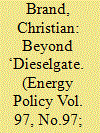

|
|
|
|
|
| Summary/Abstract |
The ‘Dieselgate’ emissions scandal has highlighted long standing concerns that the performance gap between ‘real world’ and'official’ energy use and pollutant emissions of cars is increasing to a level that renders ‘official’ certification ratings virtually ineffective while misleading consumers and damaging human health of the wider population. This paper aims to explore the scale and timing of historic and future impacts on energy use and emissions of the UK car market. To achieve this aim it applies a bespoke disaggregated model of the transport-energy-environment system to explore the impacts of retrospective and future policy scenarios on the UK car market, trade-offs between greenhouse gas and air quality emissions, and fuel use and associated tax revenues. The results suggest that the impacts on human health of ‘real world’ excess NOX emissions in the UK are significant. Future ‘low diesel’ policies can have significant air quality benefits while showing few (if any) carbon disbenefits, suggesting future car pricing incentives may need to be rebalanced taking more account of effects of local air pollution. Car pricing incentives are however unlikely to transform the car market without additional market changes, industry push, infrastructure investment and policy pull aimed at cleaner, lower carbon vehicles.
|
|
|
|
|
|
|
|
|
|
|
|
|
|
|
|
| 4 |
ID:
126613
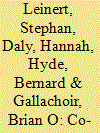

|
|
|
|
|
| Publication |
2013.
|
| Summary/Abstract |
With the current focus of policy action on climate change mitigation, it is important to investigate possible negative side effects of climate change policies on air pollutants. A 34% increase in CO2 emissions from private cars in Ireland over the period 2000-2008 prompted a change in private car taxation in 2008 to incentivise the purchase of lower CO2 emitting cars. The impact has been successful and the measure has accelerated the dieselisation of the car fleet. This however, raises an important question, namely how does the dieselisation of the car fleet affect NOx emissions? This paper combines two models to address this question, a car stock model to generate activity data (future composition and activity of Ireland's car stock) and the COPERT model to quantify the NOx emissions generated in the period 2008-2020. Previous analysis shows that the CO2 taxation policy measure is anticipated to deliver a 7% reduction in private car related CO2 emissions in 2020 compared with a baseline pre-tax scenario. The results here show that NOx emissions decrease in all scenarios, but a lesser degree of reduction is achieved due to dieselisation, with NOx emissions in the post-tax scenario 28% higher than the pre-tax scenario in 2020.
|
|
|
|
|
|
|
|
|
|
|
|
|
|
|
|
| 5 |
ID:
091533
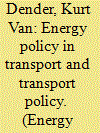

|
|
|
|
|
| Publication |
2009.
|
| Summary/Abstract |
Explanations for, and indirect evidence of, imperfections in the market for private passenger vehicle fuel economy suggest there is a reasonable case for combining fuel economy standards and fuel or carbon taxes to contribute to an energy policy that aims to reduce greenhouse gas emissions and improve energy security. Estimates of key elasticities, including the rebound effect, indicate that the positive and negative side-effects of fuel economy measures on transport activities and external costs are limited. However, an energy policy for transport does not replace a transport policy that aims to manage the main transport externalities including congestion and local pollution. Conventional marginal cost estimates and standard cost-benefit reasoning suggest that policies that address congestion and local pollution likely bring benefits at least as large as those from fuel economy measures. But the large uncertainty on the possible effects of greenhouse gas emissions constitutes a strong challenge for standard cost-benefit reasoning. Emerging results from methods to cope with this uncertainty suggest that policies to stimulate the widespread adoption of low-carbon technologies in transport are justified.
|
|
|
|
|
|
|
|
|
|
|
|
|
|
|
|
| 6 |
ID:
127147
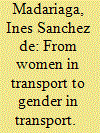

|
|
|
| 7 |
ID:
186438


|
|
|
|
|
| Summary/Abstract |
The electrification of the car fleet is an essential transformation to a meaningful reduction of greenhouse gas emissions in road transport. This has been a major goal of European transport policies, but other actions can also enhance the effectiveness of EVs to reduce emissions. In this paper we analyse four key European and German transport policies and assess how these could be improved to increase their potential to reduce emissions. Using iterative feedback from 12 interviews across various stakeholder groups, we have developed proposals for revised policies on electric vehicles. The results show that current policies in the EU and Germany are not making use of the full environmental potential of EVs, because they do not differentiate sufficiently between different EVs, and have been designed for the era of combustion vehicles. We suggest that the introduction of a new Bonus-Malus Registration Scheme and the overhaul of the existing Road Tax System are the most promising changes both in terms of their potential to reduce emissions and their likelihood of adoption.
|
|
|
|
|
|
|
|
|
|
|
|
|
|
|
|
| 8 |
ID:
094227


|
|
|
|
|
| Publication |
2010.
|
| Summary/Abstract |
For years, the world has enjoyed the luxury of inexpensive transport fuels, resulting in the continuous expansion of transport demand and vast improvements in mobility levels. The threat of peak oil and other environmental concerns, however, are forcing a paradigm shift in terms of transport planning. In recent times, many developed nations have been investigating alternative ways and means of weaning themselves off oil as the main transport energy source and managing transport energy demand. South Africa is a developing nation that, in terms of transportation technology and policy, lags behind developed countries. This presents South Africa with the opportunity to learn from other countries' triumphs and mistakes and to skip over obsolete investment patterns and ineffective policy. It needs to be determined what South Africa can do to bend the stream of continuously growing transport (energy) demand, without hampering growth in mobility. Solutions can potentially be found by looking at the European Union's past and present situation and responses. This paper summarises various European energy management transport policies. These policies are translated into a South African context-pros, cons and implementation viability are identified.
|
|
|
|
|
|
|
|
|
|
|
|
|
|
|
|
| 9 |
ID:
133293
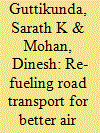

|
|
|
|
|
| Publication |
2014.
|
| Summary/Abstract |
Road transport in India plays a vital role in our growing economy. Given an aggressive vehicle sales outlook through 2030, in order to maintain a balance between the energy demand, growing on-road emissions, and overall air quality in the cities, there is a need to implement and enforce Bharat-5 standards (equivalent of Euro-V) nationwide by 2015. Any delay in its implementation or even staggered implementation of the standards will result in a delayed response for improving air quality in the Indian cities.
|
|
|
|
|
|
|
|
|
|
|
|
|
|
|
|
| 10 |
ID:
171472


|
|
|
|
|
| Summary/Abstract |
Electric vehicles are perceived as a key alternate to internal combustion engine vehicles for a transition to a decarbonized society. However, this transition towards the electrification of transport has not made equal progress globally, and faced several impediments to consumer adoption of EVs across the Nordic region and beyond. While there has been a multitude of reasons provided in the literature, we aim to characterize the barriers that remain to electrification today, as well as their perceived interconnections and futures. To provide insight into this query, the authors conducted 227 semi-structured interviews with transportation and electricity experts from 201 institutions across seventeen cities in Denmark, Finland, Iceland, Norway, and Sweden. The qualitative results and consequent cluster analysis show that common barriers like range, price and charging infrastructure continue to persist, despite technological advancements over the recent years. At the same time, results also show that barriers are highly interconnected and are commonly connected to consumer knowledge and experience. The article concludes with a discussion of policy implications of the findings and potential future research.
|
|
|
|
|
|
|
|
|
|
|
|
|
|
|
|
|
|
|
|
|